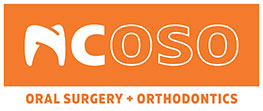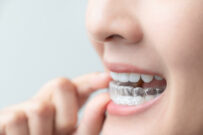
Everyone loves to smile, a silent spread of joy; and, it’s contagious. Yet for many, self-conscious embarrassment hides a beautiful smile because they hate their crooked teeth. If that describes you, perhaps you’ve asked yourself, “can adults get braces too?”
There are many reasons adults consider braces. The opportunity or need for braces may not have been present as a young teen. Your oral health needs may have unexpectedly changed. Or, perhaps you didn’t realize adults can get their teeth straightened just as easily as children and teens can.
Now, there are more options than ever before for adult orthodontics to improve smiles and overall oral health. In fact, adults make up more than one-half of orthodontic patients in the US, primarily because dentists and orthodontists alike are continually offering more options. Orthodontic treatments and appliances are also more discreet than the metal contraptions you may remember from school. They’re lighter, more comfortable, and more affordable. Back-of-the-teeth lingual orthodontics, clear or tooth-colored ceramic and porcelain, and clear aligners (such as Invisalign©– the most advanced clear aligner in the world) are just a few popular options, shaping your best smile fifty percent faster.
Why is adult orthodontics more popular than ever?
Our teeth are staying stronger a little longer with each generation. But, like the rest of the body, our teeth and gums can also succumb to the challenges of aging. Even as adults our teeth can move, shifting naturally or due to medications or accidents. Even more commonly, however, adults are deciding to wear braces or other orthodontic devices for strictly cosmetic reasons: they’ve always had crooked teeth, and now they have the means and opportunity to do something about it.
So, if you think you may be a candidate for braces, let’s look at a few things to consider.
Health considerations for adult orthodontics
Misaligned teeth can cause problems beyond the cosmetic, and these issues can usually be resolved once the teeth are properly aligned. Without proper alignment, patients deal with earaches, headaches, jaw pain, and abrasions inside the mouth.
Unlike young patients, adults also have other health conditions and concerns. Adults that may suffer bone loss or circulatory conditions will benefit from a consult with their dentist or other health professionals. Extractions are often needed. Other ongoing health concerns may exist that should be discussed with their physician.
How will my diet or dental routine change?
If you or your children have not worn braces, you may be wondering what type of difference it will make in your daily routine. While it will likely take some getting used to, nothing about wearing your new braces should cause serious inconvenience or hardship.
It’s important to practice good oral hygiene and follow your orthodontist’s instructions on brushing and flossing. Follow their advice for your diet as well, or you may quickly learn why they recommend not eating hard, sticky and crunchy food such as popcorn, jerky, hard bread or cookies, pretzels, nuts, raw carrots and the like. Your braces can be damaged and repairs are costly and.
How long will I wear braces and exactly what do they do?
In general, the time spent wearing braces is shorter now than it used to be. The process may take a little longer for adult patients than younger patients, however, since older teeth move more slowly. You can expect to wear your braces about 18 months.
Installation is about a one to two-hour process and regular visits for adjustment are a must. Each adjustment will aid the braces to gently ‘push’ the teeth in the desired direction. Slight discomfort is normal when braces are adjusted. This is usually temporary and over-the-counter pain relief does the trick when needed. Invisalign© patients replace the temporary appliance during maintenance visits. Eventually the bones and roots readjust to create your beautiful smile.
Other Questions You May Want to Ask Your Orthodontist:
- Options, such as types of braces, other appliances.
- How long will you need them? What happens when they are removed.
- Instructions, directions and advice for proper oral care, changes to make in your normal routine.
- Office visits, maintenance, how to handle damages or repairs.
- Cost, payment plans, insurances etc.
Whether cosmetic or a health decision, getting braces is a simple process, with more options becoming more affordable and they have the highest rate of success in adult orthodontics. So, if you’ve ever wondered, “can adults get braces too?” the answer is a resounding YES!
Contact NCOSO to discuss your options for adult orthodontics.



